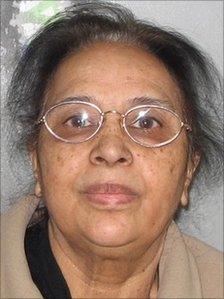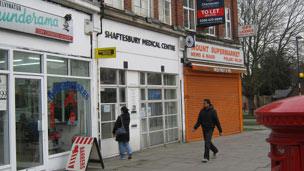A case of modern day slavery in the suburbs
- Published
A pensioner has been convicted of trafficking and exploiting an African woman she used as a slave. While it was the first prosecution of its kind, could there be many more cases behind the UK's front doors?
An innocuous bungalow in a leafy London suburb might not be an obvious location for "modern-day slavery".
But that is what 47-year-old Mwanamisi Mruke suffered at the hands of Saeeda Khan.
The 68-year-old hired Mrs Mruke in her native Tanzania in 2006 after she was made redundant from the hospital in Dar es Salaam run by Khan and her late husband.
Khan arranged a domestic service visa and promised to pay her 120,000 shillings (£21) a month into her Tanzanian bank account and £10 a month pocket money in London.
Mrs Mruke, desperate to fund her daughter Zakia's college education, agreed.
But when she got to London, Khan took her passport away, forced her to sleep on the kitchen floor and gave her two slices of bread a day for food. Her clothes were kept in a garden shed.
Between 0600 and midnight each day, Mrs Mruke was expected to be at the beck and call of Khan, who would ring a bell when she or her two grown-up, disabled children wanted something.
Sometimes she would even be woken during the night to take Khan's son out for a walk.
Mrs Mruke did not get a single day off in four years.
Trapped in the house in Harrow, north-west London and terrified by veiled threats made by Khan, Mrs Mruke was cowed into submission.
Khan, who watched television in her native Urdu, deliberately did not teach Mrs Mruke any English and conversed with her in Swahili.
After a while, the pittance she was being paid dried up completely.
Khan refused to let her return home after the deaths of her mother and father or for her daughter's wedding in 2009.
Caroline Haughey, prosecuting, told Southwark Crown Court: "From the moment of her arrival in England Mwanamisi was made to sleep, work and live in conditions that fall by any understanding into that of slavery."
Eventually, in February 2010, during a visit by Mrs Mruke to her local GP, the doctor and an interpreter - Rhoda Mwanga - became concerned about her living conditions and her interaction with Khan.
Mrs Mwanga contacted a charity, Kalayaan, which looks out for people trafficked into domestic servitude. It in turn rang the police.

Saeeda Khan would ring a bell to summon Mwanahamisi Mruke
Ten days later, police officers, accompanied by Mrs Mwanga and staff from Kalayaan, visited Khan's home and took Mrs Mruke to a place of refuge.
Mrs Mwanga told the court: "When we were in the kitchen, Mwanamisi said 'that's where I sleep' and pointed at the floor."
Khan was arrested and later charged with trafficking a person for exploitation.
During the investigation police found a sinister letter, written in Swahili and by someone in Tanzania, which warned Mrs Mruke not to complain about her treatment.
Videolink reunion
The letter said: "While you're still working with the woman and her children you must obey her all the time and you must do your work with love and show your love to the children."
The letter warned her that her life might be in danger if she spoke out, adding: "We are asking you to stay quiet in that place and to continue with work peacefully. Your blessing will be in Heaven, not here."
Her daughter, Zakia Ali Hassan, speaking by videolink via a Swahili interpreter, told the court how happy her mother was when she was rescued from Khan's clutches.
She added: "I would have loved for my mother to be there [at my wedding] but I had no choice."
Because Mrs Mruke has been unable to return to Tanzania since being rescued, Judge Geoffrey Rivlin allowed the videolink to be kept open for a few minutes to allow mother and daughter to see and speak to each other.
On Wednesday Khan was given a nine-month prison sentence, suspended for two years, and was ordered to pay £25,000 in compensation to Mrs Mruke and £15,000 in costs.
Speaking after the conviction, Ms Mruke said: "I didn't have any time for myself at all. I worked for very long hours - sometimes I didn't sleep. I used to do all the housework, cook, cleaning, inside and out.
"She didn't attack me physically. It was just the words and the way she was treating me."
Det Insp Kevin Hyland, who headed the investigation, said it was the first time someone had been prosecuted for trafficking a "slave" for domestic servitude.

A doctor at this Harrow surgery became concerned during an appointment with Mwanamisi Mruke
He said the Metropolitan Police were currently investigating another 15 cases of trafficking for forced labour, and had worked with forces in Surrey, Sussex, Hertfordshire and the West Midlands on similar cases.
Mr Hyland said: "We are seeing more of this but we are putting it down to improvements in our intelligence-gathering. We have introduced a new system of direct reporting which allows charities and NGOs to notify us directly."
Commodity
Mr Hyland said the cases under investigation involved individuals from Saudi Arabia, India, Bangladesh, Tanzania, Uganda and Vietnam.
"In some of these cases their culture is a class system and people can be treated as a commodity," he said. "They have such disregard for these people that they don't think they are doing anything wrong. They think they are worth less than an animal."
Mr Hyland said anyone employing a domestic servant in the UK on more than a very temporary basis has to pay them at least minimum wage and treat them according to UK laws.
About Mrs Mruke, he added: "She may want to go back to Tanzania, because she has a family there. But if she can't go back for fear of reprisals I'm sure that would be looked upon positively by the UK Border Agency."
A spokeswoman for Kalayaan said: "Law enforcement has typically struggled to identify trafficking for domestic servitude because domestic work itself is lawful and need not be exploitative.
"We are therefore encouraged that a case has finally come to the court under the Asylum and Immigration (Treatment of Claimants) Act that was passed nearly seven years ago."
Chris.Summers-INTERNET@bbc.co.uk , external
Update 15 February 2012: Saeeda Khan's conviction was later quashed by the Court of Appeal, which ordered a retrial. On 17 January 2012, she was acquitted at Southwark Crown Court.
- Published16 March 2011
- Published8 March 2011